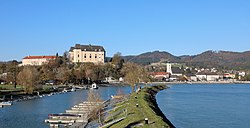Grein | |
|---|---|
 | |
| Coordinates: 48°13′41″N14°51′02″E / 48.22806°N 14.85056°E | |
| Country | Austria |
| State | Upper Austria |
| District | Perg |
| Government | |
| • Mayor | Mag. Rainer Barth ([ÖVP]) |
| Area | |
• Total | 18.41 km2 (7.11 sq mi) |
| Elevation | 239 m (784 ft) |
| Population (2018-01-01) [2] | |
• Total | 2,926 |
| • Density | 160/km2 (410/sq mi) |
| Time zone | UTC+1 (CET) |
| • Summer (DST) | UTC+2 (CEST) |
| Postal code | 4360 |
| Area code | 07268 |
| Vehicle registration | PE |
| Website | www.grein.ooe.gv.at |
Grein is a municipality in the district Perg in the Austrian state of Upper Austria. It lies on the Danube River.


